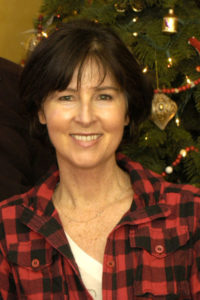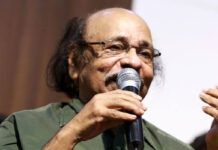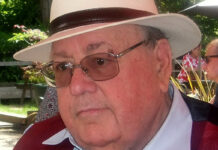Interviewed by Robin Gregory
Dr. Abhimanyu Pandey occupies a teaching post at the University of Allahabad. International and national publishing credits include essays on Multiculturalism, Contemporary Literary Theories, Gender, Shakespeare, Tagore, Kamala Markandaya, Jhumpa Lahiri, Michael Ondaatje, Gautam Malkani, Khaled Hosseini, and others. The following interview came about through an exchange of emails, in which Dr. Pandey kindly agreed to answer questions about his personal, academic, and literary journey.
Tell us a bit about yourself, about your work as an academician and educator. Also, can you share a little about your early life and personal interests?
Let me begin by thanking Modern Literature for publishing this interview. I consider myself extremely privileged in answering the questions put to me by one of the most talented writers of literary fiction today, Robin Gregory.
I am a Guest Faculty Assistant Professor in the Department of English and Modern European Languages at the University of Allahabad. My thesis is on Contemporary Multicultural Fiction. I am the eldest of four brothers and sisters. We are a close-knit traditional family. I went to school at Ghazipur in Eastern Uttar Pradesh and then came to the University of Allahabad for higher education. I stayed in a university hostel and was awarded a doctorate in 2018.
The University of Allahabad is one of the four oldest educational institutions established during the British rule in India. The buildings are grand and its general atmosphere is enviable. Its time-defying qualities are enhanced by the congruence of three nearby rivers. If you study here, you cannot help but fall in love with the place. The English Department embraces creative writers in an atmosphere of innovation and inspiration. Faculty and students are rather self-contented
Do you remember when you first decided to study philosophy? How has it come to correlate with literature and multiculturalism for you?
Philosophy is like the mother hen under which so many subjects get nourished like chicks. It caters to almost every subject related to knowledge or wisdom. The moment you join the arts stream you enter the domain of philosophy. It is difficult for me to recollect when exactly philosophy spread its wings over my consciousness. Aristotle said literature was more particular than philosophy and more general than history. Due to a natural fascination with the philosophical underpinnings, I studied both literature and history, while doing my undergraduate work. For who can read these subjects without moralizing about life or significant people, and about the nature of existence itself?
Literature edifies and reflects life not only as it is, but as it largely ought to be. My thesis on Contemporary Multicultural Fiction suggests that multiculturalism has turned out to be far from the Promised Land that it was intended to be. Those that settle in Europe and America, giving up their native soils, are seeking a better life. But multicultural fiction, which is written by highly sensitive minds, reveals that those very seekers in the West remain outsiders. They are seldom truly accepted unless they achieve extraordinary success. The desire to keep America and Europe white is one that will live on despite claims of multicultural theorists.
Tell us a little about your book.
Literary Explorations: Contemporary Fiction and Poetry was written during the time I was working on my doctoral thesis. The process exposed me to a great deal of Contemporary Literary Theory. The study of fiction and poetry led to a body of work that ultimately defined the focus of the book.
I am fascinated by contemporary academic perspectives, which take into account the marginalized lot of humanity; the women, the colonized, the coloured, the settlers in multicultural societies. My mind has always reached out to those great literary authors, philosophers, and theorists who have cared to write for them, and bring about some kind of justice in an otherwise little-caring world. Fiction is a great medium for bringing awareness to people. Human nature tends to be self-centered and Hobbesian, the world divided inequitably between the haves and the have-nots, the whites and the non-whites, the men and the women, the host countries and the migrants, and so on. The truly contemporary writer or scholar is conscious of injustices that prevail in our world, and is valuable to culture and society as a whole. My book is an attempt to further their literary efforts.
Who would benefit most from reading it?
Those interested in contemporary literature, particularly fiction and poetry, students and academics in literature departments, particularly those interested in magical realism as it has evolved to its present incarnation. This version of magical realism would include social and geopolitical claims made by governments about multiculturalism. Anyone keen to explore the works of Khaled Hosseini, Michael Ondaatje, Margaret Atwood, Gautam Malkani, and others like them could find something to think about in this book. Certain questions about voice in literature, Post-Truth, narrative skills, culture, biography, and autobiography figure as well. These are issues of varied interest and are likely to attract a great many students and sensitive minds.
What do you deem most relevant about your collective writings?
I think my pieces on magical realism and voice are what anyone interested in literary studies would find relevant. There have been several interpretations of magical realism, but mine is quite different. It shows the path that magical realism is taking. For example, Robin Gregory’s recent book, The Improbable Wonders of Moojie Littleman, is set in America, but an underlying Eastern philosophy and spirituality contradicts the Western viewpoints. This is a departure from previous magical realism in the West, particularly Latin America. Similarly, Lakshmi Raj Sharma’s The Tailor’s Needle is set in India, but it examines Western influences on Indian society. In either case, these novels challenge social and political power of the West.
In my book, the chapter on voice references two poems by Sylvia Plath. It shows how the voice of an author can be contained in a persona, a character who speaks from behind a self-created mask. The inner feelings of authors can be discovered in such personas. Gautam Malkani’s narrative skills and dialogue contain a multicultural discourse. He cites the example of the “rudeboys” from South Asia who settled in London as an example of contemporary multiculturalism in England. We see how the young émigré in London is not interested in improving his lifestyle or social standing. He, the outsider, prefers rather to model behaviour that annoys the insider. Furthermore, Malkani suggests that even Brit youngsters are drawn to this rudeboy culture in preference to their own.
You seem to be drawn to Magical Realism as poetry and fiction. Why is it a literary form of interest to you? Or, what distinguishes it from mainstream literature?
Yes, magical realism does draw me probably because it largely voices a challenge to that colonizing mentality which crushes individual growth. It is another way of perceiving reality. Fiction by definition is the opposite of fact and therefore fiction can never really be the reality; it is merely a semblance of reality. Magical realism is more decidedly a different route: it uses non-tangible modes to enhance perceptions of reality.
The colonizing spirit, which considers itself and no other to be legitimate, needs to be challenged. We need to discover alternative ways of understanding the world through inner perceptions, visions, and authorial voices. The process requires an act of going deeper into human life rather than merely remaining at the surface. The difference between the two approaches is somewhat like the difference between romanticism and classicism, that is to say, they are defined by different viewpoints. Mainstream literature prefers not to go beyond what is described as “rational,” whereas magical realism adopts a multi-level approach that normalizes the extra-rational in order to depict a truer experience of reality. This kind of perception is surprisingly more than rational, not less. The poet or litterateur’s imagination can get beyond surface realities and see much more than is visible. It is therefore only right for them to show readers what they have perceived. Why deny anyone this extraordinary perception?
You name Shakespeare a magical realist. What work in particular comes to mind?
In an interview, Marquez says that he cannot deny an influence of Shakespeare even though he has used a different approach. Similarly, other magical realist novelists, such as Salman Rushdie and Ben Okri, have acknowledged Shakespeare’s influence.
I believe that magical realism didn’t begin with a painterly style of 1900s Germany or in literary circles of 1950s Latin America. It existed much earlier. Some Renaissance poets, particularly Shakespeare, seemed to read into the secrets of nature. A play like Macbeth can present witches and ghosts as though they are customary in the lives of men. It relies on the supernatural so heavily that its entire structure will crumble if the supernatural element is taken away from it. The same can be said for plays such as A Midsummer Night’s Dream, The Tempest, and others. In Hamlet, much that happens relies on the ghost of Hamlet’s father. This play mixes the real and the unreal as though there is nothing unusual about it. The appearance of the ghost is merely a foreboding that needs to be taken care of. No one disbelieves that such a thing can happen.
In ancient Greek tragedies, people take prophecies and forebodings seriously. It can be said that the magical has always existed in the arena of faith. One can have faith in virtually anything, but the rational mind often disagrees with such allegiance. Faith comes from inner conviction that often springs from a non-rational base, inner realizations that cannot be dispelled.
How does magical realism differ from surrealism and fantasy? Can you give a few examples of specific works, poetry and fiction?
This is no easy question, but I will try to answer it very briefly. Surrealism and magical realism keep reason at bay just as fantasy does. However, surrealism is a virtual psychic automatism, which helps one to express the real functioning of thought. In this, reason seems to remain absent and outside of all moral or aesthetic preoccupation. The surreal gives a prime place to dreams in the “disinterested play of thought.” Dreams are considered important enough to take care of virtually any problem that life can offer, philosophical or otherwise. It must be remembered that a number of Marxist influences also affect surrealism.
Magical realism is not so focused in terms of the functioning of thought; it inheres in the style of narration that can tell improbable things in a highly probable manner. Dreams can play a part in it as they indeed do, more noticeably in the case of Gabriel García Márquez’s magical realism. But dreams are not as central to magical realism as they are to surrealism. In magical realism, the uncanny suddenly becomes the norm. From the magical emerge certain lessons for the real world. The “magical” element in magical realism often takes us toward a combined human/spiritual experience.
Fantasy relies on medieval or ancient mythical settings and legends. Supernatural and magical themes are significant in the way they distort reality. Nature and real events are treated without precision. Fantasy, science fiction, and horror have certain similarities, all of which shun the real world.
What advice would you give writers of magical realism?
I would say do not try to write like García Márquez unless you possess his caliber of genius. His novels are labyrinths in which time, past, present and future, become so intertwined that only someone of his ability would be able to keep things under control. A novel like The Improbable Wonders of Moojie Littleman can be a great model because even though it contains all the elements of magical realism, it keeps the story and plot quite down to earth. Its message of how spirituality can cure bodily malfunctions is amazing.
Who are your favorite authors and poets? How have they affected you?
I have liked Khaled Hosseini immensely There are few living authors who tell a story as well as he. He grips you totally. He is able to combine in his fiction the qualities of the bestseller with those of a much more serious and classic writing. I like Jhumpa Lahiri for her thought- provoking stories about Indians who settle abroad. I admire Michael Ondaatje for his literary fiction and poems. I have marveled at how these authors can take you into another world, make you cry, laugh, be awestruck, learn from surrogate experience, and then return to your own situation—better able to cope with life.
What is the best advice you ever heard?
Never have too much faith in anyone because human beings are human and will have their own problems and vices. Making anyone a god and then assuming he will fulfill that expectation is the worst mistake you can make. “Learn this from water: loud splashes the brook but the ocean’s depth is calm.” – Gautam Buddha
About the Interviewer

















